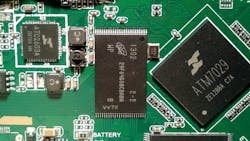Globalfoundries Sues TSMC; Seeks Import Ban on IPhone Parts
Globalfoundries Inc. sued larger rival Taiwan Semiconductor Manufacturing Co. for using its patented chip technology and requested a U.S. trade agency impose import bans that could roil the market for crucial components of a huge swath of electronics, including the iPhone.
The U.S.-headquartered chipmaker, which like TSMC manufactures semiconductors for other companies, on Monday filed patent-infringement complaints at the U.S. International Trade Commission in Washington, as well as civil lawsuits at federal courts in the U.S. and Germany.
The complaints cite TSMC and customers including Apple Inc., Broadcom Inc., Qualcomm Inc., Xilinx Inc., Nvidia Corp. and their device-maker customers including Cisco Systems Inc., Alphabet Inc.’s Google and Lenovo Group Ltd. TSMC is the contractor that makes chips designed by companies like Qualcomm and Nvidia that are then used in devices including Apple iPhones, Lenovo laptops and Cisco routers.
The broad-ranging legal assault threatens to disrupt the supply of everything from smartphones to personal computers to vital infrastructure like switches and routers that are the backbone of the internet. It highlights the importance of TSMC as a supplier of the components that keep modern electronics running. It also comes at a time when the worldwide supply chain is being disrupted by a burgeoning trade dispute between China and the U.S.
TSMC spokeswoman Elizabeth Sun said her company hasn’t been served with any court papers and it isn’t familiar with the details of the suit.
"TSMC has always respected intellectual property and we have developed all our technologies by ourselves," Sun said.
TSMC’s American depositary receipts dipped on the news and were up less than 1% to $41.32 at 9:48 a.m. in New York.
Globalfoundries is positioning the case as U.S. and European inventions being illegally used by an Asian company that has an increasing stranglehold on crucial parts of the technology industry.
“Someone had to do something, the world needs a competitive semiconductor industry,” said Sam Azar, senior vice president of corporate development at Globalfoundries. “We’re using courts in the U.S. and Europe that care about protecting manufacturing.”
Globalfoundries has factories in upstate New York and Dresden, Germany. Its headquarters is in Silicon Valley. The closely held company is owned by Mubadala, the investment arm of the government of Abu Dhabi.
Globalfoundries, like other so-called contract chipmakers, has struggled to keep pace with TSMC whose factories are now rated the best in the industry. The U.S.-based company is seeking ‘substantial’ damages from its Taiwanese rival which it alleges is using Globalfoundries’ technology to help it win tens of billions of dollars of sales, it said in a statement.
German courts work quickly, and are known for ordering a halt of products even before litigation is completed to protect patent owners. The ITC in Washington, whose mission is to protect U.S. markets from unfair trade practices, also has a reputation for speed with investigations completed in 15 to 18 months. It has the ability to block products entering the world’s largest economy. The American civil suits, filed in federal courts in Delaware and Texas, would take longer but could result in large damage awards.
Throughout the complaint, Globalfoundries cited products including Apple iPhone models, AirPods, Apple TV and iPad models. It also mentioned Cisco’s switch boxes as using infringing chips and Lenovo computers that are based on Nvidia graphics chips.
The patents it’s asserting cover the fundamentals of how semiconductors are manufactured. Some are U.S. patents and others are European covering esoteric but important areas like “structures of and methods and tools for forming in-situ metallic/dialectric caps for interconnects.” They involve the most advanced technique, called 7 nanometer, that TSMC is currently using.
Meanwhile, GlobalFoundries announced a year ago that it would halt development of 7-nanometer chip and focus on more mature technology as the company struggles to match TSMC’s annual capital expenditure of some $11 billion.
Globalfoundries’ Azar said his company wants TSMC to stop using the patented technology, which will be difficult to work around, or ask for a license and pay for the right to continue using the inventions.
Companies like Apple, Cisco and Nvidia are named in the complaints because TSMC doesn’t import the chips or sell them to consumers; the only way to stop the chips from entering the U.S. and Germany is to block the products that use them.
Global Foundries filed the complaint after U.S. President Donald Trump issued a tweet on Aug. 23 saying American companies “are hereby ordered to immediately start looking for an alternative to China.” His administration claims he has the authority to impose such an order though trade experts disagree.
By Ian King and Susan Decker
About the Author
Bloomberg
Licensed content from Bloomberg, copyright 2016.
